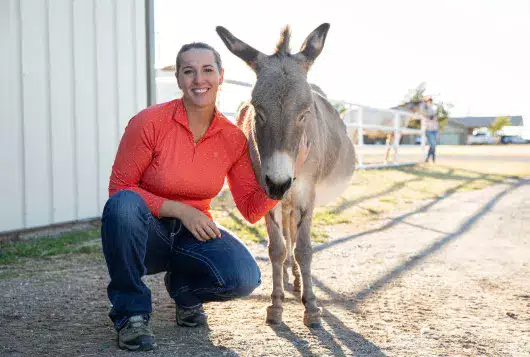Four Tips for Healthy and Happy Donkeys

Caring for long-eared equids is very different than caring for horses. Here are four critical tips to keep your donkeys feeling fine.
Get a Correct Weight
Estimating a donkey’s weight is not the same as estimating a horse’s weight. Donkeys’ body shape and composition mean they carry their weight differently. A donkey weight chart allows you to estimate weight by measuring a donkey’s height and heart girth. There are weight tapes designed specifically for use with donkeys—do not use a horse weight tape since it will give you an inaccurate estimate. You can do an online search for “donkey weight tape”—here’s just one example.
Learn How to Calculate Body Condition
Did you know that donkeys can calcify fat? Very thin or emaciated donkeys may not show their weight loss in the same way as horses because of these hardened fat deposits that don’t go away even when they are underweight. Because of the differences in body shape and the way that donkeys carry weight, you must use a donkey body condition scoring system.
Understand Medical Quirks
We know that donkeys are significantly different than horses in presentation of diseases, dosages of medications and bloodwork. The difficulty is that often this information is not readily available or more research needs to be done because the full extent of the differences isn’t known. Here are a few great resources to assist in treating donkeys, including a clinical exam aid and a dental care handbook.
Consider Training
Although they are often perceived as stubborn, training donkeys can be effective and enjoyable for everyone involved. Many donkey caregivers have even had success with clicker training!
To learn more about proper donkey care, watch this video from the Donkey Welfare Symposium.
Downloads
Download AllWe have lots more on this subject:




